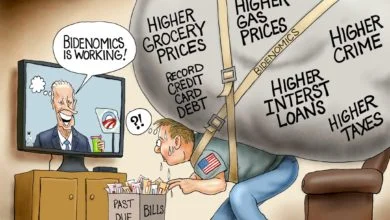Why I Love Landlords – Foundation for Economic Education
Last week my heart sank as I stood staring at my water meter. I had shut off the water to my house, but the little triangle on the water meter was still spinning. In other words, I had a water leak. I was losing a gallon of water every four or five minutes.
It may not sound like much, but that’s 9,000 gallons of water leaking into the ground outside my house every month. A slight uptick in my water bill tipped me off. Next month’s bill would be much higher.
But higher water bills wasn’t my main concern. A bigger one was the potential sinkholes and foundation problems which that much water could create.
My house has a wrap-around porch which is a nice feature… until something goes wrong under the porch. I called a plumber who brought in a small team who dug up most of the water line with a backhoe, but they couldn’t reach the part that ran under the porch.
I had three options: I could take off the porch, dig out the dirt under the porch and foundation myself, or hire someone to do the digging.
I opted to dig under the porch by myself.
Fast forward to Sunday at 2:00 a.m., I found myself lying down in a dirt trench of my own making, carving out the mud to tunnel up from under my foundation to expose the old water pipe. And as I was digging, a singular thought rang in my head.
I miss having a landlord.
Landlords, Leeches, and Love
I suspect I am in a minority with my appreciation for landlords. After all, anti-landlord sentiment is pervasive. They’re a favorite target of celebrities and members of the journalism industry. The rhetoric is often intense. Landlords are frequently dehumanized as leeches.
The argument comparing landlords to leeches is simple: landlords didn’t build the buildings they rent out, they just own them. They do nothing productive, and force people to pay to live in their property. That makes them leeches, right?
Like many simple arguments, this one is wrong for several reasons. I’ll focus on one reason in particular.
Landlords don’t just sit around and do nothing. Their main role is to bear significant risk, and you’re kidding yourself if you think that’s not bringing value to the table.
We can think of two major risks landlords face. First, housing markets can crash. It hasn’t been that long since we’ve seen that happen. Any landlord whose investment portfolio was majorly composed of real estate in 2008 and 2009 could forget about retiring in the near future. Any time the housing market performs worse than other possible investments, landlords are losing.
The second risk is the kind that blew up in my face (or water line) this last weekend. Landlords risk losing the value of their property when the property deteriorates.
Landlords bear risk because houses provide people with a stream of services. Individuals don’t buy houses just to look at. Houses provide key goods that people seek such as protection from weather, climate control, and running water.
The problem is all of these services cost time and money to maintain. A roof to keep out weather, a new HVAC system for climate control, and fixes to underground water lines are some of the most expensive repairs (think thousands of dollars, not hundreds).
As I learned this weekend, these are also some of the most difficult repairs. Tunneling under a foundation with a hand tool is no joke. My hands still hurt while I type this story. As an academic, I don’t tend to have a lot of difficult physical labor in my week, believe it or not!
I wished I had a landlord while I laid in the tunnel. Since a landlord’s financial interest is tied to the property, they have incentives (and less importantly, some legal obligations) to address issues for the tenants, such as needed repairs and replacements. If I had a landlord, he or she would eat the expense and hire a team to come out and do the job for me. I could be asleep in bed instead of in a hole.
At this point, the anti-landlord crowd might scoff. “Landlords don’t actually repair broken things! They just sit around and refuse to address problems with the property.”
While there are some cases of suboptimal upkeep, these are mostly driven by rent control laws, which limit the options of consumers.
And, in my case, a landlord certainly would not have delayed the repair. As I mentioned, the water leak under my house likely would have destroyed the foundation eventually.
Would an evil, greedy landlord destroy the value of their entire property just to save a smaller amount on repairs? Obviously not.
It wouldn’t surprise me if someone who’s never done extensive repairs on their property could underrate this service that landlords provide. I certainly did before digging the ditch and paying my plumbers.
There’s No Investment Panacea
The argument that landlords do nothing and make tons of money simply doesn’t pass the smell test. Free markets don’t provide unlimited streams of income for people who do nothing.
If landlords just sat around all day doing zero work and earning mountains of money, everyone who could get a mortgage loan would become a landlord.
In reality, real estate, though it can generate a lot of revenue, involves taking on very costly repairs or a lot of hard work. That risk, while still acceptable to me, is not one that should be underrated.
And if that isn’t productivity, I don’t know what is.
Content syndicated from Fee.org (FEE) under Creative Commons license.
Agree/Disagree with the author(s)? Let them know in the comments below and be heard by 10’s of thousands of CDN readers each day!




